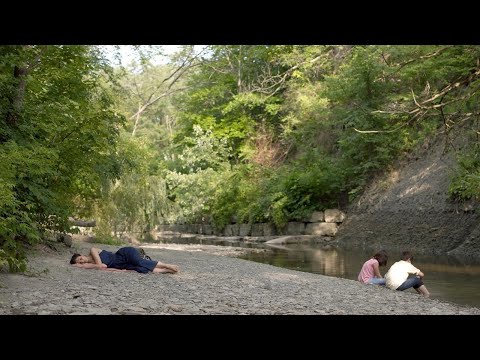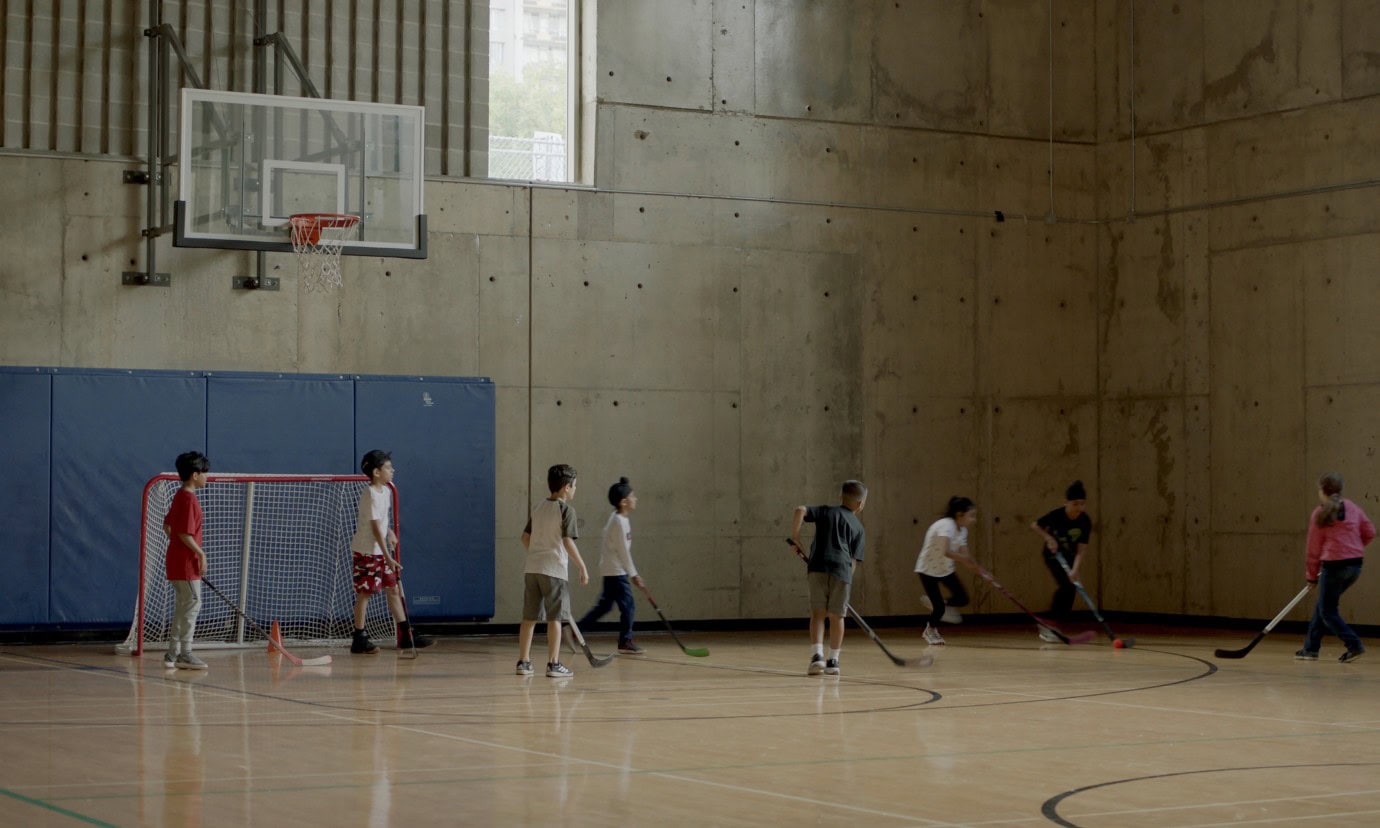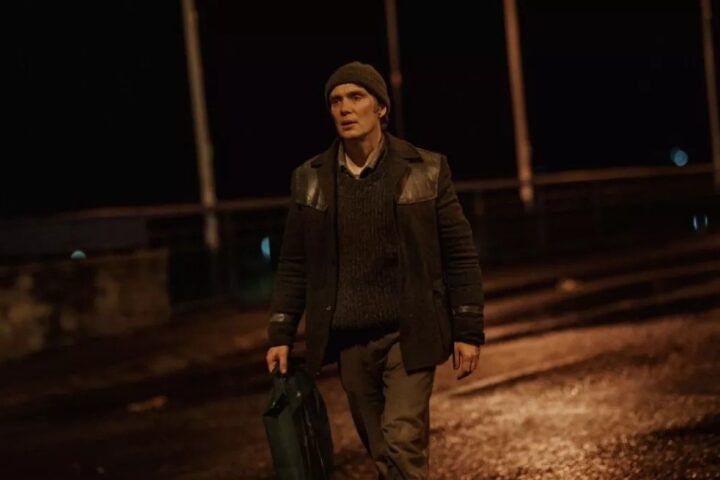Straddling the hazy line between documentary and fiction, the work of Canadian filmmaker Antoine Bourges is intensely concerned with the plights of disadvantaged and marginalized populations. In his latest and most quietly impactful effort to date, Concrete Valley, Bourges turns his gaze toward the North American immigration struggle, further examining the sense of dislocation that often defines his films’ subjects/characters.
The film is set in Thorncliffe Park, a high-immigrant, low-income neighborhood of Toronto whose titular nickname stems from its geographical position nestled up against a lush hillside forest, and it begins with Rashid (Hussam Douhna), a Syrian immigrant, taking a solitary nighttime walk through these tranquil woods. The curiously hushed environment at first suggests a dream, lending Concrete Valley a sense of magical realism that corresponds to mythical tales of strangers traversing strange lands. When Rashid’s impromptu sylvan meanderings are discussed a short time later, he’s warned about the potentially dangerous wildlife he could encounter in the woods, enhancing the setting’s air of chimeric mystery.
It’s easy to understand Rashid’s desire to roam into the unknown once he returns to the high-rise apartment he shares with his wife, Farah (Amani Ibrahim), and young son, Ammar (Abdullah Nadaf). Rashid was an accomplished doctor back in his native country, and his skills, like those of many immigrants, have gone unrecognized and underutilized in his adopted homeland. Too stubborn to find other work that he considers beneath him, Rashid instead spends his days offering pro bono medical advice to others in the building and surrounding neighborhood. Meanwhile, Farah, who was a working actress in Syria, shoulders the majority of the family’s financial load, working a dreary retail clerk job at a beauty supply store.
Rashid and Farah’s immigrant experience is of a quotidian stripe often overlooked on screen in favor of exaggerated drama, with Bourges and Teyama Alkamli’s screenplay based around situations from the lives of the film’s non-professional actors. Concrete Valley, then, presents a measured and verisimilar depiction of Rashid and Farah’s struggles, filtered through the filmmaker’s signature aesthetic of exactingly sparse visual compositions that imbue a subtle poeticism into the day-to-day reality of people simply trying to make ends meet.
Where Concrete Valley’s tension arises is in the loss of personal identity that Rashid and Farah experience in their new home and the cracks that form in their relationship as a result of it. Rashid’s coping mechanism for his feelings of humiliation is to condescend to Farah, as in a dinnertime conversation where she relates an upsetting incident at work involving an aggressive customer who berated her for apparently recommending the wrong type of skin cream. When Rashid instantly and rather callously takes the customer’s side, Farah retorts, “I love how you make people feel like dogs,” sending a brief shockwave through the air, before the two quickly settle back into their routines for the sake of their son, who sits at the table silently observing them, stewing in private and appearing emotionally adrift by his parents’ troubles.

Rashid and Farah spend much of the film in their own worlds, and Concrete Valley thoughtfully examines the way that neighborhood social systems provide them with an outlet to foster a fresh sense of solidarity and purpose. Throughout, we see Rashid attend English language classes, a supportive environment which fosters a friendship with another Syrian immigrant, the more easy-going Suliman (Suliman Hafed), who gradually breaks through Rashid’s numb exterior. Rashid also opens up to a neighbor, Yanah (Lynn Nantume), who he begins aiding with natural therapy for the chronic pain in her leg, rekindling both his confidence in his medical discipline and the compassion that he had clearly lost sight of in the wake of his move to Canada.
For her part, Farah joins a volunteer group dedicated to cleaning up garbage in the surrounding forest, as a way to take responsibility for the landscape they call home. This activity sends her out on her own more practical woodsy excursions in pursuit of meaning, while also allowing a camaraderie to blossom with the group’s leader, Saba (Aliya Kanani).
Can Rashid and Farah find one another again through their new endeavours? Bourges keeps this narrative pressure at a delicate simmer, aided in no small part by the achingly naturalistic performances from his cast, essentially playing versions of themselves. And while the occasional staginess of their line readings can draw attention to the artificiality of the film’s scripted construct, it’s only inasmuch as it perfectly reflects the boundless trepidation that Rashid and Farah feel in forging new paths in a society that appears largely indifferent to their toils.
Ultimately, the story’s ostensibly mundane or trivial affairs take on a grand significance, as in Rashid’s determined quest to help restore the long-absent hot water in his building so that Farah can finally take a comfortable bath. This crusade becomes the unexpectedly moving thrust of the film’s second half, and as Rashid enlists the help of Suliman and others, Concrete Valley reveals itself as a thrilling example, both in form and content, of the way that the fostering of community allows us to regain some measure of control over life’s adversities.
Since 2001, we've brought you uncompromising, candid takes on the world of film, music, television, video games, theater, and more. Independently owned and operated publications like Slant have been hit hard in recent years, but we’re committed to keeping our content free and accessible—meaning no paywalls or fees.
If you like what we do, please consider subscribing to our Patreon or making a donation.



